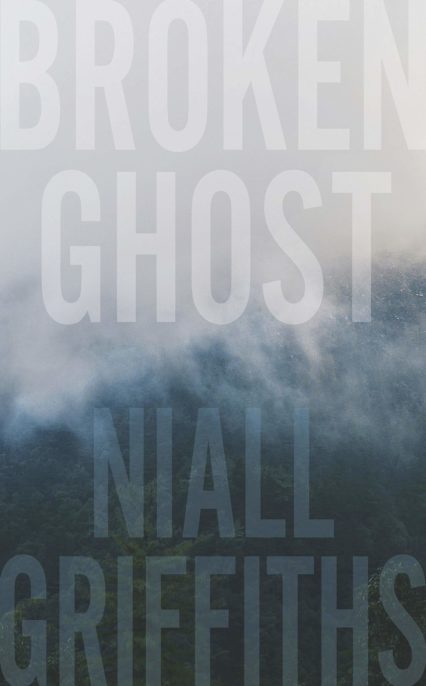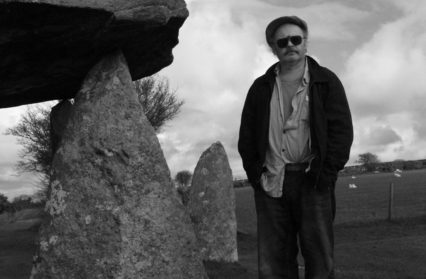Gareth Kent reviews Niall Griffiths’ haunting depiction of modern Welsh society encumbered by austerity and disconnection in his new novel, Broken Ghost.
 Through its passionate denunciation of the socio-political climate surrounding austerity and Brexit, Broken Ghost emphasises a malaise dominating contemporary British society. Those familiar with Niall Griffiths know what to expect: a richly textured evocation of place alongside a gritty concoction of depravity, sex, drugs, booze, and violence. Stylistically, its form follows the traditions of Charles Bukowski and Irvine Welsh – it is a demotic gut-punch to skittish readers. Not only is Broken Ghost rife with regional dialects, it doubles-down – perhaps too excessively for some – of the grit and squalor characterising – yet, often peripheral and vacant from the face most want to see – of British society. This unflinching approach and demotic style grounds the narrative and ensures that even its secondary characters remain memorable throughout, whereby each possesses a unique accent.
Through its passionate denunciation of the socio-political climate surrounding austerity and Brexit, Broken Ghost emphasises a malaise dominating contemporary British society. Those familiar with Niall Griffiths know what to expect: a richly textured evocation of place alongside a gritty concoction of depravity, sex, drugs, booze, and violence. Stylistically, its form follows the traditions of Charles Bukowski and Irvine Welsh – it is a demotic gut-punch to skittish readers. Not only is Broken Ghost rife with regional dialects, it doubles-down – perhaps too excessively for some – of the grit and squalor characterising – yet, often peripheral and vacant from the face most want to see – of British society. This unflinching approach and demotic style grounds the narrative and ensures that even its secondary characters remain memorable throughout, whereby each possesses a unique accent.
The novel begins with its three central characters – Emma, Adam, and Cowley – walking atop a mountain lake on the outskirts of Aberystwyth where the trio comes in contact with a spectral figure of a woman. From there, Broken Ghost proceeds to delve into its heady examination of the lives lead by each character. From the catharsis of the spectral encounter, the reader observes the deflation of that mood when collared by the socio-political realities of the post-referendum, tidily punctuated with Jeremy Kyle, “tepid Stella”, and the Welsh person’s choice – curry on chips.
Emma is a single parent struggling to make ends meet through benefits and her weekly part-time job caring for the elderly – earning her a measly £10 extra a week. Adam is a recovering addict of drugs and alcohol, while Cowley is a labourer who possesses a violent temperament inflamed through his dwindling opportunities and traumatic childhood. Initially, the spectral encounter incites within each a harmonious fortitude. Emma blogs about her spectral encounter, which soon trends on social media – spurring a semi-religious movement – providing her with a sense of purpose. Adam gains an appreciation for the simple pleasures found in nature, a resulting tranquillity likewise affording him a renewed sense of identity. Meanwhile, Cowley’s rage is eased through a newfound equanimity and “slow-release” from his qualms.
When the novel is not entrenched in the dialectal, what emerges from its prose is a profoundly lyrical meditation on our relationship with nature:
AND THESE COLOURS, pink and milky making of the lake’s waters the liquids on which infants are brought into the world. At the edge, where the water laps at the land, the damp earth nibbles and sucks at the feet of the people as if hungry for them to return.
Broken Ghost’s frequent splatters of neo-romanticism appear to echo Dylan Thomas, while its decry of mediatisation and spiritual underpinnings veers on the works of R.S Thomas. Broken Ghost, however, signals that total escapism is not possible – be that religion, nature, media, or consumption – from the stark realities of our urban milieu. “Distract: everything comes down to that”. It suggests that British society does not “rage or even question, just muddles through” by state-sponsored acts of mass-distraction. In this way, browsing Twitter, Facebook, and watching Jeremy Kyle and Avatar become acts analogous to meaningless sex, violence, and consumption of drugs and alcohol. Griffiths likewise highlights how the blame is often shifted onto those most affected, where they are themselves reduced to the spectacles depicted on television screens and social media.
Naturally, each character’s peace is quickly upturned and revealed as but a fleeting reprieve that is easily displaced when confronted by the socio-political realities of our epoch. The trio swelters under the looming threat of eviction, and are, consequently, forced into their pursuits of self-destruction in want of a buzz to numb their pains, as is demonstrated in the following extract:
Perhaps because catastrophe itself is its own anchor, a ruination self-willed is just a holed boat when everything is sinking anyway and oh the thrill of the plummet, the deepening of the colours from to blue to black. What does the jumper see between the twentieth floor and the ground? In those seconds, what choirs are heard in the whistling zoom of the air? Now there is a boom in Adam’s chest. Just step off because there is nothing up here. Nor is there anything down there but that space between the two is fuller than forever.
Throughout Broken Ghost then, Griffiths foregrounds how people are rendered dependent upon spectacles, mediatisation, addiction, violence, and sex, through this need for an outlet. In a manner not dissimilar to a character from a William Gibson novel, Emma disassociates from the flesh and begins to view her true-self as the self that exists in cyberspace. She seeks to distance her concerns via engaging in a drunken rampage alongside a stream of meaningless sexual encounters. Adam returns to an alcoholic dependency after the closure of the Rhoserchan rehab centre. Cowley, however, participates in the underground scene of bare-knuckle boxing, the momentary ecstasy of the fight providing both an outlet and monetary gain.
This destruction of the self is intimated through Griffiths’ shifting narrative voice, primarily through one long section that chaotically jumps between each character in a tumultuous tapestry of decay. While the early and closing chapters for each character alternates between each of their first-person vernacular voices, the narrative voice shifts to the third-person whenever it’s detailing their self-destruction. This employment of the third-person is a distancing strategy emphasising their disassociation but also underscoring how people are easily moulded into caricatures when denied a voice. This is likewise demonstrated through the novel’s message board chapters which reflect the increasing disconnect between people in our increasingly mediatised world.
Overall, while the novel’s fascination with squalor might be too much for more light-stomached readers, Broken Ghost succeeds through its unflinching approach. It is a tempestuous journey of recovery and decay all the way up to the despotism of its harrowing finish which serves as a wrenching reminder that the prelude of the dystopian tomorrow is today.
Broken Ghost by Niall Griffiths is available now from Penguin.
You might also like…
Carolyn Percy reviews Rebecca F. John’s The Haunting of Henry Twist, a fresh take on historical fiction that explores a haunting which is all too real.
Gareth Kent is a contributor to Wales Arts Review.



 Enjoyed this article? Support our writers directly by buying them a coffee and clicking this link.
Enjoyed this article? Support our writers directly by buying them a coffee and clicking this link.








